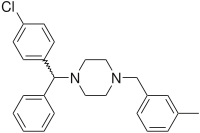Meclizine
 |
|
| Clinical data | |
|---|---|
| MedlinePlus | a682548 |
| Pregnancy category |
|
| Routes of administration |
Oral, sublingual/buccal |
| ATC code | R06AE05 (WHO) |
| Legal status | |
| Legal status | |
| Pharmacokinetic data | |
| Metabolism | hepatic |
| Biological half-life | 6 hours |
| Identifiers | |
|
|
| CAS Number |
569-65-3 |
| PubChem (CID) | 4034 |
| IUPHAR/BPS | 2757 |
| DrugBank |
DB00737 |
| ChemSpider |
3894 |
| UNII |
3L5TQ84570 |
| ChEMBL |
CHEMBL1623 |
| ECHA InfoCard | 100.008.477 |
| Chemical and physical data | |
| Formula | C25H27ClN2 |
| Molar mass | 390.948 g/mol |
| 3D model (Jmol) | Interactive image |
| Boiling point | 230 °C (446 °F) |
|
|
|
|
|
|
|
Meclizine (INN, or meclozine) is an antihistamine considered to be an antiemetic. It is sold under the brand names Bonine, Bonamine, Antivert, Postafen, Sea Legs, and Dramamine II (Less Drowsy Formulation). Emesafene is a combination of meclizine (1/3) and pyridoxine (2/3). In Canada, Antivert Tab (which is no longer available) was a combination of meclizine and nicotinic acid.
Meclizine is a first-generation antihistamine (nonselective H1 antagonist) of the piperazine class. It is structurally and pharmacologically similar to buclizine, cyclizine, and hydroxyzine, but has a shorter half-life of six hours compared to cyclizine and hydroxyzine with about 20 hours (though half-life should not be confused with duration). It is used as an antivertigo/antiemetic agent, specifically in the prevention and treatment of nausea, vomiting, and dizziness associated with motion sickness. Meclizine is sometimes combined with opioids, especially ones of the open-chain class like methadone, dextropropoxyphene, and dipipanone (originally combined with meclizine's parent drug cyclizine, the brand name of this combination is Diconal).
Meclizine is an antagonist at H1 receptors. It possesses anticholinergic, central nervous system depressant, and local anesthetic effects. Its antiemetic and antivertigo effects are not fully understood, but its central anticholinergic properties are partially responsible. The drug depresses labyrinth excitability and vestibular stimulation, and it may affect the medullary chemoreceptor trigger zone. Meclizine also is a dopamine antagonist at D1-like and D2-like receptors, but does not cause catalepsy in mice, perhaps because of its anticholinergic activity.
...
Wikipedia
